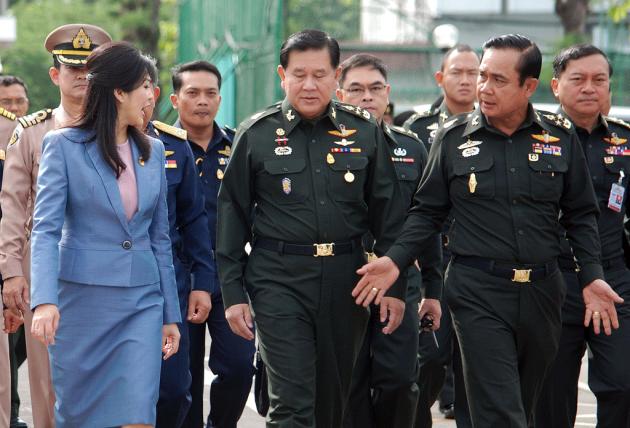'Improved' govt-military ties face crucial test

Upcoming military reshuffles will say a lot about Thailand's political future
Relations between the Pheu Thai government and the military are approaching another crunch time as the annual Armed Forces reshuffle draws nearer. Optimists, in other words those who do not predict any “political accident” happening, are seeing good signs, not least in the apparent warming of ties between Prime Minister Yingluck Shinawatra and the military’s top brass. Pessimists say the “prelude” can be deceptive, and the real measure of “peaceful coexistence” can only be seen from the final reshuffle list, which has yet to be announced.
Both camps have good viewpoints. For the optimists, Yingluck, who also serves as the defence minister, has won an unprecedented degree of military trust. Budget-wise, her government has seemed able to satisfy the military. And, perhaps most importantly, it would take extremely bold, if not reckless, generals to try to overthrow the government by force today. The 2006 coup has provided plenty of lessons, and the economic risks at the time of the last takeover were not even as prominent as now.
For the pessimists, Thai politics is dictated by vested interests and not much else. This means that better bonds, bigger budgets and the world economy may not figure that much if the generals feel threatened by a loss of leverage. There are a few positions in the military that the Armed Forces leadership and the Pheu Thai camp have to agree on. Those appointments will determine if the current “balance” holds, or if it will be tilted in Pheu Thai’s favour, in which case tensions may rise quite precipitously.
The military chieftains have declared time and again that coups are now “obsolete”. Such an affirmation, however, means little as Thai political history proves. The Pheu Thai camp realises this, but that is not necessarily a good thing. Mistrust only breeds mistrust. To try to contain the military out of lingering mistrust can only amplify any ill feelings both camps may still have. To try to pre-empt a putsch, Pheu Thai can end up provoking the generals.
It’s like walking a tightrope. The political mindset is that, in a democracy, an elected government should be able to do whatever it wants where the military is concerned. Thai political realities have seen democratic ideals go out of the window when elected representatives “meddled” too much with the Armed Forces. Thai politics is far from mature. The military is not mature enough to accept elected politicians as its bosses. Likewise, elected politicians are not mature enough to avoid using the Armed Forces as their own power base.
It’s hard enough under normal circumstances, but Thai political complexities have made it a lot harder. This is why the upcoming military rotation carries great significance. Both sides don’t need to be told that they must strive to reach a compromise, but their perceived “stakes” may make any real concessions hard to materialise. The government would want to set the stage for greater control of the Armed Forces next year when more hard-core generals reach retirement, but the current military powers would want to make sure a sound foundation is laid down for the people it approves of.
Nepotism will unavoidably be at play. So, it will be a matter of containing it for the greater good. A government-military clash over positions and promotions can
produce disastrous consequences, and it will be bad for the nation as a whole, no matter whom we condemn.
RELATED
